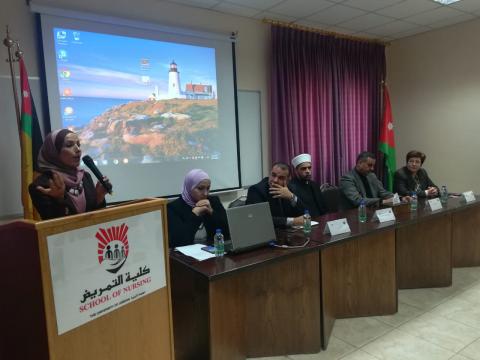

On Tuesday, the Higher Population Council, in cooperation with the Faculty of Nursing at the University of Jordan, held a panel discussion on the importance of reproductive health services and information provision to adolescents and youth.
The workshop, which was attended by the faculty members of the Faculty of Nursing at the University of Jordan and a group of university students, aimed at promoting positive trends towards the importance of youth-friendly reproductive health information and services among the participants, while taking into account the sensitivity of the local culture and religious values.
The Discussion panel addressed a number of topics, the most prominent of which was “the importance of reproductive health services and information provision to adolescents and youth as an integral part of the primary health care system”, which was presented by Dr. Rima Al-Safadi, a faculty member at the University of Jordan’s Faculty of Nursing. Furthermore, His Grace, Dr. Ahmed Al-Harasis, from the General Iftaa’ Department addressed the topic “Islamic religion’s view on adolescents and youth receiving reproductive health services and information from reliable sources and specialized institutions such as health and psychological services providers.”
Furthermore, the Director of the Family Protection Department, Brigadier Dr. Talal Al-Abdallat, also discussed the issue of “lack of reproductive health services and information within the family, especially for adolescents and youth, and its effect on the emergence of all forms of violence and family issues”. Moreover, Colonel Dr. Ramzi Al-Dabak, from the Criminal Investigation Department, discussed “the risks of cybercrime to which adolescents and the youth may be exposed as a result of receiving reproductive health information from unreliable sources.”
Moreover, during the panel, which was conducted by the Director of Programs Unit in the Higher Population Council, Sawsan Al-Da'jahh, an expanded discussion among participants on the topic.
It is worth mentioning that HPC considers the issues of adolescent and youth a priority population and development issues that must be addressed in the upcoming years, since Jordan is on the verge of a demographic shift, one of its most prominent features is the growth of the population group within the ages of the working force (64-15 years). Furthermore, the growth of the dependent group at ages under 15 and 65 years and over requires the optimal investment of the work force category, especially youth, raising their health awareness, providing the necessary health services, and enhancing their health behaviors.







